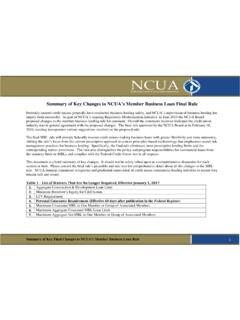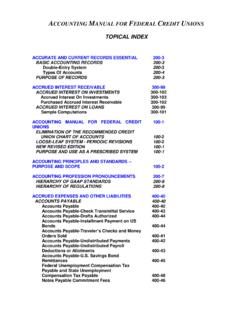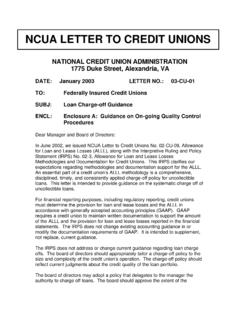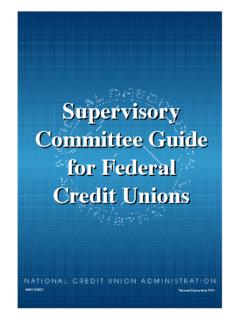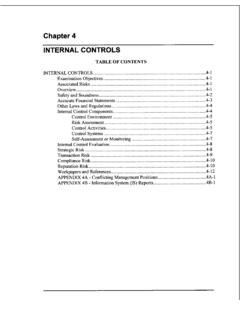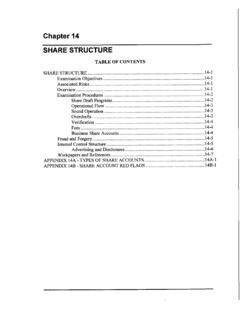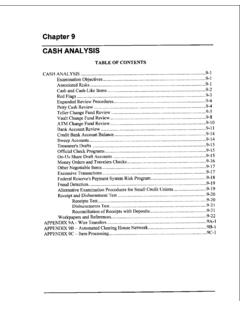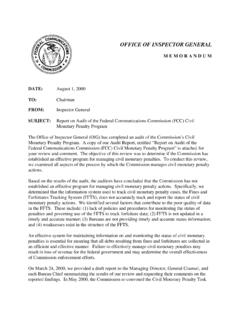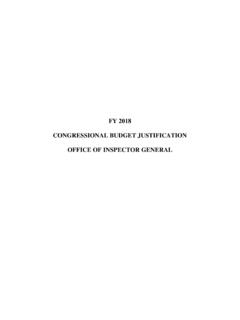Transcription of OFFICE OF INSPECTOR GENERAL - ncua.gov
1 OFFICE OF INSPECTOR GENERAL AUDIT OF THE ncua S COMPREHENSIVE RECORDS MANAGEMENT PROCESS Report #OIG-18-05 March 14, 2018 OFFICE of INSPECTOR General1775 Duke Street - Alexandria, VA 22314-6113 - 703- 518-635 0 National Credit Union Administration SENT BY EMAIL TO: Distribution List FROM: INSPECTOR GENERAL James W. Hagen SUBJ: Audit of ncua s Comprehensive Records Management Process DATE: March 14, 2018 The National Credit Union Administration ( ncua ) OFFICE of INSPECTOR GENERAL (OIG) conducted this self-initiated audit to assess ncua s records management process. The objectives of our audit were to determine: 1) whether the ncua has a comprehensive records management framework, retention, and disposal system in place; and 2) whether the ncua is in compliance with applicable records management policies, procedures, laws and regulations. Results of our audit determined that the ncua lacks a comprehensive records management program and needs to implement the steps that will correct the areas of weakness.
2 In addition, we found that the depth and scope of the issues we identified are due in large part to management not making records management a priority due to competing priorities. We concluded the ncua does not have a comprehensive records management framework, retention, and disposal system in place. We also concluded that those charged with governance over records management for the agency did not consistently follow applicable laws, regulations, and guidance to ensure the ncua had a comprehensive records management program in place. This report makes five recommendations to ncua management that we believe will help those with the authority to manage records for ncua improve the records management program. ncua management agreed to all recommendations and provided corrective actions taken and planned. We appreciate the effort, assistance, and cooperation ncua management and staff provided to us during this audit. Distribution: Chairman J. Mark McWatters Board Member Rick Metsger Executive Director Mark Treichel GENERAL Counsel Michael McKenna PACA Director Mary Anne Bradfield Deputy Executive Director John Kutchey Chief Information Officer Ed Dorris Attachment OFFICE of InspectorGeneralPage | iTABLE OF CONTENTS Section Page EXECUTIVE SUMMARY.
3 1 BACKGROUND ..4 RESULTS IN ncua Lacks a Records Management Policy and Program ..8 Communication Issues at All Levels ..10 Recommendation 1 ..14 Improvements Needed for Training ..14 Recommendation 2, 3 ..16 Record Retention Schedules Not Timely Updated ..16 Improvement Needed Over Managing Records ..18 Recommendation 4 ..20 Recommendation 5 ..21 APPENDICES: A. Objectives, Scope, and Methodology ..23 B. ncua Management Response ..25 C. Acronyms and Abbreviations ..27 OIG-18-05 Auditof theNCUA s Comprehensive Records Management ProcessNCUA OFFICE of INSPECTOR GeneralPage | 1 EXECUTIVE SUMMARY The National Credit Union Administration ( ncua ) OFFICE of INSPECTOR GENERAL (OIG) conducted this self-initiated audit to assess the ncua s comprehensive records management process. The objectives of our audit were to determine: 1) whether the ncua has a comprehensive records management framework, retention, and disposal system in place; and 2) whether the ncua is in compliance with applicable records management policies, procedures, laws, and regulations.
4 Results of our audit determined that the ncua lacks a comprehensive records management program and needs to implement the steps that will correct the areas of weakness. In addition, we found that the depth and scope of the issues we identified are due in large part to management not making records management a priority due to competing priorities. We concluded the ncua does not have a comprehensive records management framework, retention, and disposal system in place. We also concluded that those charged with governance over records management for the agency did not consistently follow applicable laws, regulations, and guidance to ensure the ncua had a comprehensive records management program in place. Specifically, we found: 1. The ncua lacked records management policies and procedures during the scope period of our audit (2012 2016). Specifically, management did not follow federal law by establishing policies and procedures to govern an agency-wide records management program.
5 However, management issued a records management policy on January 31, 2018, as a foundation for a records management program moving forward. 2. Many instances where more or better communication could have facilitated ncua s records management. Specifically, we found that management did not update the ncua Board on specifics related to records management, offices did not effectively communicate about records management with each other, and management did not give comprehensive guidance to staff on how to handle OFFICE or personal records in the conduct of their day-to-day duties. 3. During the scope period of our audit, management did not provide training to staff for records management, as required by National Archives and Records Administration (NARA) regulations and NARA and OFFICE of Management and Budget (OMB) circulars. Training for ncua personnel regarding their records management responsibilities did not begin until June of 2017. 4. Management did not timely assess and update record retention schedules, as needed.
6 Specifically, management did not ensure that the offices had periodically assessed and updated, as needed, their records schedules. OIG-18-05 Auditof theNCUA s Comprehensive Records Management ProcessNCUA OFFICE of INSPECTOR GeneralPage | 2 5. Based on the ncua s plan, management believes the agency will meet the NARA/OMB 2019 requirement to manage all permanent records electronically by the end of 2019. However, we determined ncua will not have a single dedicated system established to manage electronic records until 2021. Although the ncua met NARA/OMB s 2016 requirement to retain emails electronically, we determined current information technology (IT) solutions do not allow for emails to be easily searched, identified, or retained. As a result, we are making five recommendations that we believe will help the ncua implement a comprehensive records management program. ncua management contracted with NARA in 2016 to assess the ncua s current records management environment and to identify records and apply appropriate disposition in accordance with approved records schedules for the ncua .
7 NARA s assessment concluded in October 2016 and provided the ncua with information and recommendations to improve records management. We acknowledge that management has already taken significant steps to address the findings and recommendations in this report; however, we did not assess management s actions because they occurred outside the scope period of our audit. In March 2017, ncua management established a team of employees from across the agency and led by the OFFICE of GENERAL Counsel (OGC), to implement improvements to the records management program. Prior to the transition to OGC, records management was the responsibility of the OFFICE of the Chief Information Officer (OCIO). Management provided us with the following accomplishments the records management team achieved, which occurred outside the scope period of our audit: Establishment in January 2018 of an OFFICE specifically focused on records management for the agency, including a newly authorized senior executive position to lead the operation, two new attorneys to be responsible for the agency s privacy program and seven new authorized staff positions to implement the program.
8 Establishment in early 2017 of a records liaison for each OFFICE and the new records management team, which has yielded approved records file plans for nearly every ncua OFFICE improved communication and training for all staff on records management responsibilities and provided ongoing guidance through a records management intranet website. Updated all records retention schedules to mirror current operation status including the collaborative effort with NARA to establish records management schedules for the ncua s Asset Management Assistance Center (AMAC). Established a privacy policy and records management policy to guide staff compliance efforts. OIG-18-05 Audit of the ncua s Comprehensive Records Management Process ncua OFFICE of INSPECTOR GeneralPage | 3 Reduced hard copy records at AMAC by properly migrating the substantial number of documents to the approved offsite records management service facility. This effort allowed the ncua to eliminate the leased storage facility.
9 Strengthened the agency s records management posture in priority areas across the agency including AMAC. This includes implementing controls and processes for record intake and management, increasing the use of readily available technology for managing and storing records electronically to reduce the need to create or maintain physical records, and enhancing security of electronic records and created a secure electronic media room for electronic record assets acquired during liquidations. We appreciate the cooperation and courtesies ncua management and staff provided to us during this audit. OIG-18-05 Audit of the ncua s Comprehensive Records Management Process ncua OFFICE of INSPECTOR GENERAL Page | 4 BACKGROUND The ncua is the independent federal agency created by the Congress to regulate, charter, and supervise federal credit unions. The ncua s organizational structure consists of a Central OFFICE , AMAC, and five regional offices. Although the ncua does not receive annual appropriated funding from Congress to carry out the agency s operations, the ncua s operating fund contains the attributes of a revolving fund,1 which is a permanent appropriation.
10 The ncua is authorized to collect annual operating fees, define the purpose for which these collections may be used, and use the collections without fiscal year limitation. The Federal Records Act of 1950 ( Federal Records Act), defines records management as the planning, controlling, directing, organizing, training, promoting, and other managerial activities involved with respect to records creation, maintenance and use, and disposition, in order to achieve adequate and proper documentation of the policies and transactions of the federal Under the Federal Records Act, agency records that are required to be preserved and disposed of appropriately include all documentary materials, regardless of physical form or characteristics, made or received by an agency under federal law or in connection with the transaction of public business, and preserved or appropriate for preservation by that agency or its legitimate successor as evidence of the organization, functions, policies, decisions, procedures, operations, or other activities of the United States Government or because of the informational value of data in them.
